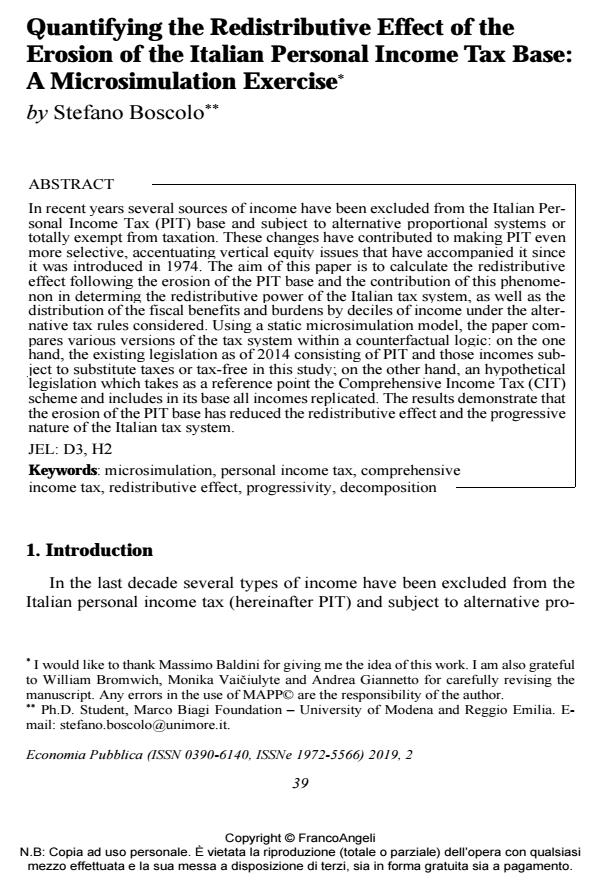Quantifying the Redistributive Effect of the Erosion of the Italian Personal Income Tax Base: A Microsimulation Exercise
Journal title ECONOMIA PUBBLICA
Author/s Stefano Boscolo
Publishing Year 2019 Issue 2019/2
Language English Pages 42 P. 39-80 File size 374 KB
DOI 10.3280/EP2019-002003
DOI is like a bar code for intellectual property: to have more infomation
click here
Below, you can see the article first page
If you want to buy this article in PDF format, you can do it, following the instructions to buy download credits

FrancoAngeli is member of Publishers International Linking Association, Inc (PILA), a not-for-profit association which run the CrossRef service enabling links to and from online scholarly content.
In recent years several sources of income have been excluded from the Italian Personal Income Tax (PIT) base and subject to alternative proportional systems or totally exempt from taxation. These changes have contributed to making PIT even more selective, accentuating vertical equity issues that have accompanied it since it was introduced in 1974. The aim of this paper is to calculate the redistributive effect following the erosion of the PIT base and the contribution of this phenomenon in determing the redistributive power of the Italian tax system, as well as the distribution of the fiscal benefits and burdens by deciles of income under the alternative tax rules considered. Using a static microsimulation model, the paper compares various versions of the tax system within a counterfactual logic: on the one hand, the existing legislation as of 2014 consisting of PIT and those incomes subject to substitute taxes or tax-free in this study; on the other hand, an hypothetical legislation which takes as a reference point the Comprehensive Income Tax (CIT) scheme and includes in its base all incomes replicated. The results demonstrate that the erosion of the PIT base has reduced the redistributive effect and the progressive nature of the Italian tax system.
Keywords: Microsimulation, personal income tax, comprehensive income tax, redistributive effect, progressivity, decomposition
Jel codes: D3, H2
- The Italian Treasury Dynamic Microsimulation Model (T-DYMM): Data, Structure and Baseline Results Riccardo Conti, Michele Bavaro, Stefano Boscolo, Elena Fabrizi, Chiara Puccioni, Ottavio Ricchi, Simone Tedeschi, in SSRN Electronic Journal /2023
DOI: 10.2139/ssrn.4546893 - Simulating Long-Run Wealth Distribution and Transmission: The Role of Intergenerational Transfers Michele Bavaro, Stefano Boscolo, Simone Tedeschi, in Italian Economic Journal /2025 pp.947
DOI: 10.1007/s40797-024-00304-3 - The Struggle of Being Poor and Claimant: Evidence on the Non-Take-Up of Social Policies in Italy Stefano Boscolo, Giovanni Gallo, in Italian Economic Journal /2024 pp.625
DOI: 10.1007/s40797-023-00230-w - Regional Support for the National Government: Joint Effects of Minimum Income Schemes in Italy Giovanni Gallo, in Italian Economic Journal /2021 pp.149
DOI: 10.1007/s40797-019-00118-8 - The contribution of tax-benefit instruments to income redistribution in Italy Stefano Boscolo, in ECONOMIA PUBBLICA 2/2022 pp.181
DOI: 10.3280/EP2022-002001
Stefano Boscolo, Quantifying the Redistributive Effect of the Erosion of the Italian Personal Income Tax Base: A Microsimulation Exercise in "ECONOMIA PUBBLICA " 2/2019, pp 39-80, DOI: 10.3280/EP2019-002003